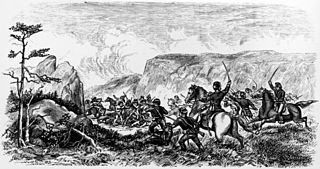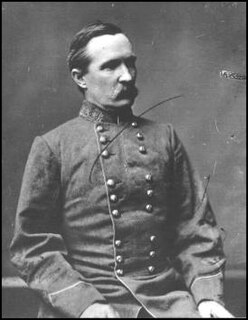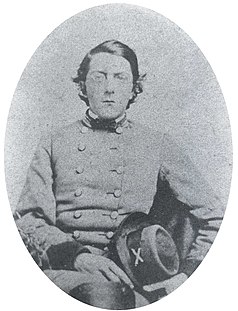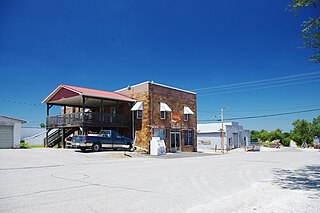
William Dorsey Pender was a General in the Confederacy in the American Civil War serving as a Brigade and Divisional commander. Promoted to brigadier on the battlefield at Seven Pines by Confederate President Jefferson Davis in person, he fought in the Seven Days Battles and at Second Manassas, Fredericksburg and Chancellorsville, being wounded in each of these engagements. Lee rated him as one of the most promising of his commanders, promoting him to major general at twenty-nine. Pender was mortally wounded on the second day of Gettysburg.

The Battle of Ash Hollow, also known as the Battle of Blue Water Creek or the Harney Massacre, was an engagement of the First Sioux War, and fought on September 2 and 3, 1855 between United States Army soldiers under Brig. Gen. William S. Harney and a band of the Brulé Lakota along the Platte River in present-day Garden County, Nebraska. In the 20th century, the town of Lewellen, Nebraska, was developed here as a railroad stop.

Henry Heth was a career United States Army officer who became a Confederate general in the American Civil War.
Ḥet or H̱et is the eighth letter of the Semitic abjads, including Phoenician Ḥēt , Hebrew Ḥēth ח, Aramaic Ḥēth , Syriac Ḥēṯ ܚ, Arabic Ḥā' ح, Maltese Ħ, ħ.
Joice Heth was an African-American slave who was exhibited by P.T. Barnum with the false claim that she was the 161-year-old nursing mammy of George Washington. Her exhibition under these claims, and her public autopsy, gained considerable notoriety.
John Mercer Brockenbrough was a farmer and a Confederate colonel in the American Civil War.

The Battle of Peebles's Farm was the western part of a simultaneous Union offensive against the Confederate works guarding Petersburg and Richmond, Virginia, during the Siege of Petersburg in the American Civil War.

The Battle of the Boydton Plank Road, fought on October 27–28, 1864, followed the successful Battle of Peebles' Farm in the Siege of Petersburg during the American Civil War. It was an attempt by the Union Army to seize the Boydton and Petersburg Plank Road and cut the South Side Railroad, a critical supply line to Petersburg, Virginia.
Seminole music is the music of the Seminole people, an indigenous people of the Americas who formed in Florida in the 18th century. Today most live in Oklahoma, but a minority continue in Florida. They have three federally recognized tribes, and some people belong to bands outside those groups. Their traditional music includes extensive use of rattles, hand drums, water drums, and flutes.
The Battle of Bristoe Station was fought on October 14, 1863, at Bristoe Station, Virginia, between Union forces under Maj. Gen. Gouverneur K. Warren and Confederate forces under Lt. Gen. A. P. Hill during the Bristoe Campaign of the American Civil War. The Union II Corps under Warren was able to surprise and repel the Confederate attack by Hill on the Union rearguard, resulting in a Union victory.
The Battle of Sutherland's Station was an American Civil War conflict fought on April 2, 1865, in Dinwiddie, Virginia during the Appomattox Campaign.

William Ransom Johnson Pegram, known as "Willie" or "Willy", was an artillery officer in Robert E. Lee's Confederate Army of Northern Virginia during the American Civil War. He was mortally wounded in the Battle of Five Forks. He was the younger brother of Confederate General John Pegram, who was also killed in action. His grandfather, John Pegram, was a major general during the War of 1812.

The Defense of Cincinnati occurred during what is now referred to as the Confederate Heartland Offensive or Kentucky Campaign of the American Civil War, from September 1 through September 13, 1862, when Cincinnati, Ohio was threatened by Confederate forces.
Henry "Harry" Heth was a Virginia businessman who was active in the late 1700s and early 1800s. He is most known for his famous Black Heath coal mines in Chesterfield County, Virginia. He was involved in this business from the late 1790s to his death.
John Heth, of Black Heath in Chesterfield County, Virginia, was the son of Colonel Henry "Harry" Heth, who had fought in the American Revolutionary War and established himself in the coal business in Virginia, and Nancy Hare Heth. He was named for Harry's brother, Lt. John Heth, who had also fought in the Revolutionary War and afterwards settled in the Richmond area.

Central is an unincorporated community in Heth Township, Harrison County, Indiana.
Harvey Heth (1770–1816) was born on April 28, 1770 in Virginia. He was the son of Agnes McMahon Heth and Captain Henry Heth, a new Irish immigrant to the United States and a veteran of the American Revolutionary War. He was also the brother of several other Revolutionary War veterans, including Henry Heth.

The Third Corps, Army of Northern Virginia was a unit of the Provisional Army of the Confederate States.
Joice is both a given name and a surname. Notable people with the name include:








